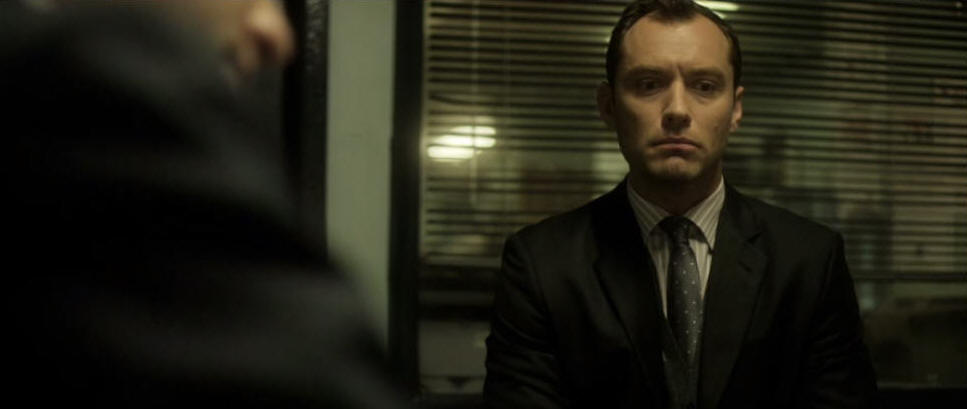MOVIE REVIEWS |
INTERVIEWS |
YOUTUBE |
NEWS
|
EDITORIALS | EVENTS |
AUDIO |
ESSAYS |
ARCHIVES |
CONTACT
|
PHOTOS |
COMING SOON|
EXAMINER.COM FILM ARTICLES
||HOME


Thursday, February 7, 2013
MOVIE REVIEW
Side Effects
When Side Effects Are The Only Effects

Jude Law as Dr. John Banks in Steven
Soderbergh's drama "Side Effects". Open Road Films
by
Omar P.L. Moore/PopcornReel.com
 FOLLOW
FOLLOW
Thursday,
February 7,
2013
The year's best film so far,
Steven Soderbergh's "Side Effects" is clever,
compelling and thrilling, using a good script by Scott Z. Burns (writer of the
director's
"Contagion" and
"The Informant!") to illuminate and elevate a sly,
entertaining movie to sophisticated noir, a throwback to some of the classics of
the genre. Mr. Soderbergh himself is something of a genre-creator, making
films with unique or relatively unexplored themes ("Magic Mike",
"The Girlfriend
Experience") and does so here with a film about doctors,
specifically Dr. John Banks (Jude Law), who is under fire after prescribing a
questionable drug for his patient Emily (Rooney Mara) who has been suffering from
depression.
Ensconced in the jargon of pills (Diprexa, Ablixa, etc.) the doctors in "Side
Effects" speak a secret language and in such a way as if speaking in tongues.
Mr. Burns' writing is whip-smart, often tongue-in-cheek, and precisely
articulated through these crises-ridden characters. Emily has been married
to Martin (Channing Tatum) for a short while. Like any marriage they have
their up and down days, and lately more down than up. Ablixa seems to be
the cure-all for Emily's malaise, but things only begin to become more hazy,
complex and haunting. Dr. Victoria Siebert (Catherine Zeta-Jones) has
prescribed medication in the past for Emily but is no longer her doctor.
A shell game within a shell game, "Side Effects" uses its atmosphere and moody
tempo to classify the state of ethics surrounding doctors, the process of
classification (particularly of women and what ails them from the viewpoint of a
sexist profession), and the elements of a moral and optical illusion.
Emily is a prism for evaluation through men -- Martin, and the wry and sarcastic Dr. Banks,
(the latter's
last name a humorous one if you cynically declare that some doctors are
money-grubbing opportunists) -- and women (Dr. Siebert), but the film is distinctly
in Emily's voice: sometimes distorted, sometimes sensual, shot with a smoky, hazy light, as if
trapped under a microscope. At times it feels as if you are being examined
as much as the characters are. The stylistic use of red -- spare, discreet
and disciplined uses of the color -- are the pulse and heartbeat of "Side
Effects".
The film morphs from thriller to drama to comedy to noir to all things at once,
and does so well and seamlessly, adapting to its environment effortlessly while
tossing new wrinkles and twists at selected turns. I was kept guessing,
and though "Side Effects" doesn't offer anything new in the way of insight into
the medical profession -- some doctors as well as some of any other professional
or any non-professional are as opportunistic as the next person -- there's a
colorfulness in the film's apparent blandness. The optics of scenes and
dilemmas are crude, smart and riveting, and while there are moments of humor,
any theatricality resulting from such situations or created by them is subdued,
almost to the level of a private joke.
"Side Effects" is the perfect experimental apparatus for Mr. Soderbergh, a
surgeon of his own in cinema. He deftly refines each scene here, even the
most mundane of which offers reveals or little twists as punchlines,
such as in one scene where Dr. Banks is at home with his wife (Vinessa Shaw,
"Eyes Wide Shut") and we see a child that we realize is the doctor's stepson.
Expectations no matter how large or small are often dashed, and "Side Effects"
is always interesting and sometimes jarring as an experience.
The film's opening shot feels like the opening shot of "Psycho", a cluster of
buildings we drift to, until we come to a singular window. Mr. Soderbergh
creates a space of expectation and place and time, and sometimes defies them but
not to be unconventional or subversive. He has confidence in his material.
He knows his craft inside and out, but chooses to politely and quietly express
the meanings of his subjects, characters and themes, creating an understated but
often devastating truth that percolates beneath the surface. Those
undercurrents show up in both "Magic Mike" and "Contagion", the latter of which
Mr. Law appeared in, and "Side Effects" as well.
If "Side Effects" is to be Mr. Soderbergh's final feature film, he's chosen to
go out of the cinematic realm in the best possible way.
Also with: Ann Dowd, Polly Draper, Mamie Gummer, James Martinez.
"Side Effects" opens tomorrow
across the U.S. and Canada. The film is rated R by the Motion Picture
Association Of America for sexuality, nudity,
violence and language.
The film's running time is one hour and 46 minutes.
COPYRIGHT 2013. POPCORNREEL.COM. ALL RIGHTS RESERVED.  FOLLOW
FOLLOW
MOVIE REVIEWS |
INTERVIEWS |
YOUTUBE |
NEWS
|
EDITORIALS | EVENTS |
AUDIO |
ESSAYS |
ARCHIVES |
CONTACT
| PHOTOS |
COMING SOON|
EXAMINER.COM FILM ARTICLES
||HOME


 FOLLOW
TWEET
FOLLOW
TWEET FOLLOW
FOLLOW